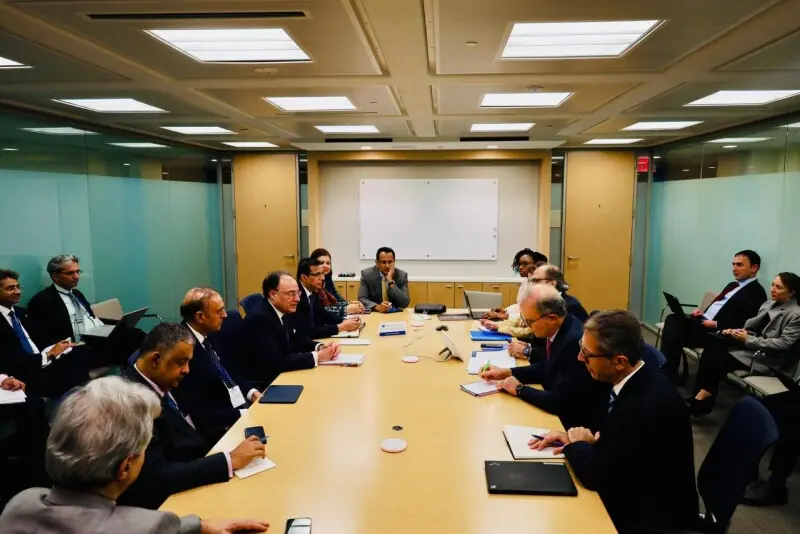Finance Minister Muhammad Aurangzeb met with Jihad Azour, Director of the International Monetary Fund’s (IMF) Middle East and Central Asia Department, on the sidelines of the Annual Meetings of the IMF and World Bank in Washington, DC. Both sides reaffirmed their commitment to Pakistan’s ongoing reform agenda and maintaining macroeconomic discipline.
The meeting also reviewed progress under the Second Review of the Extended Fund Facility (EFF) and emphasised sustaining the current reform momentum, read a statement released by the Finance Division on Tuesday.
Aurangzeb, who is on an official six-day visit to the United States, held a series of high-level meetings on the sidelines of the Annual Meetings of the IMF and the World Bank Group (WBG) in Washington DC.
The finance minister and his delegation had a key meeting with Jihad Azour, Director of the IMF’s Middle East and Central Asia Department, and his team.
“Both sides exchanged views on Pakistan’s reform agenda and reaffirmed their shared commitment to sustaining the current momentum of reforms. The meeting reviewed progress under the second review of the Extended Fund Facility (EFF) and acknowledged the importance of maintaining macroeconomic discipline,” read the statement.
This comes after Pakistan and the IMF made significant progress toward a staff-level agreement following review talks under the EFF and Resilience and Sustainability Facility (RSF), the Washington-based lender said after concluding its mission to the country.
Meanwhile, Aurangzeb also attended the Commonwealth Finance Ministers’ Meeting, where he underscored the importance of prioritising concrete actions to advance a resilient and prosperous Commonwealth.
He voiced support for the operationalisation of the Commonwealth Infrastructure and Financial Resilience Hub, as well as the Technical Assistance Fund for peer review and capacity building. The minister reiterated the central importance of climate financing for developing countries like Pakistan and emphasised the urgent need to operationalise mechanisms such as the Loss and Damage Fund.
In another meeting, Aurangzeb had extensive engagement with Axel van Trotsenburg, Senior Managing Director of the World Bank Group.
During the meeting, Aurangzeb expressed appreciation for the World Bank’s continued commitment to Pakistan’s national development agenda.
The finance minister reiterated that the climate crisis remains an existential challenge for Pakistan, referencing the devastation caused by recent floods and their severe impact on the agriculture sector and GDP growth.
He emphasised the need for enhanced investment in climate adaptation and mitigation measures and agreed on the importance of mobilising additional resources to manage future natural disasters.
In addition, Aurangzeb was hosted by the leadership and members of the US-Pakistan Business Council (USPBC).
He briefed participants on the positive trajectory of Pakistan’s macroeconomic indicators and emphasised that private sector growth is vital to sustaining economic momentum.
Aurangzeb reaffirmed the government’s commitment to addressing business challenges and providing maximum relief.
He highlighted the recent trade deal with the US authorities and expressed optimism for enhanced government-to-government (G2G) and business-to-business (B2B) engagements in key sectors, including mining, agriculture, information technology, and pharmaceuticals.
Earlier, the Finance Minister held a productive meeting with Robert Kaproth, Assistant US Treasury Secretary for International Finance, and Counsellor Jonathan Greenstein. During the discussion, the Minister highlighted the strong economic fundamentals of Pakistan, underpinned by the ongoing IMF programme.
He welcomed the successful conclusion of negotiations with the US administration leading to a tariff deal and apprised the Treasury officials about Pakistan’s recent legislation to regulate virtual assets. He further invited U.S. companies to explore investment opportunities in Pakistan’s oil and gas, mineral, agriculture, and information technology sectors.
Earlier, the finance minister held a productive meeting with Robert Kaproth, Assistant US Treasury Secretary for International Finance, and Counsellor Jonathan Greenstein.
During the discussion, Aurangzeb highlighted the strong economic fundamentals of Pakistan, underpinned by the ongoing IMF programme. He welcomed the successful conclusion of negotiations with the US administration, leading to a tariff dea,l and apprised the Treasury officials about Pakistan’s recent legislation to regulate virtual assets
He further invited US companies to explore investment opportunities in Pakistan’s oil and gas, mineral, agriculture, and information technology sectors.
During the day, Aurangzeb also met with representatives of Citi Bank, where he acknowledged Citi’s longstanding partnership with Pakistan and appreciated its continued engagement.
The minister shared an overview of Pakistan’s stabilizing macroeconomic outlook, driven by ongoing structural reforms and validated by international credit rating agencies. He also highlighted Pakistan’s growing role as a regional hub for digital innovation and financial services, assuring that the Government would give due consideration to Citi’s proposals.


